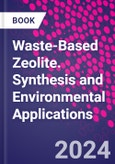Waste-Based Zeolite: Synthesis and Environmental Applications focuses on the use of waste-based materials to fabricate zeolite and its subsequent use in environmental applications. It presents recent progress in zeolite synthesis using wastes products such as fly ash, steel slag, biomass waste, water treatment plant sludge, and municipal waste, among others. It discusses the application of waste-based zeolite for environmental applications such as biodiesel production, as well as considering techniques for recovering spent zeolite. Many industries produce substantial quantities of waste material comprising various hazardous constituents that lead to pollution and threaten the environment.
However, such waste can often be a rich source of precursor ingredients for zeolite synthesis, and waste-based zeolites could potentially provide an economically and environmentally viable alternative to commercially available zeolites. This book illuminates this fascinating avenue of research.
Please Note: This is an On Demand product, delivery may take up to 11 working days after payment has been received.
Table of Contents
1. Introduction to zeolite2. Solid waste as a potential source for zeolite synthesis
3. Preparation of different types of zeolite from steel slag
4. Synthesis of zeolite from coal fly ash
5. Synthesis of zeolite from biomass fly ash
6. Utilization of municipal solid waste fly ash for zeolite preparation
7. Zeolite synthesis from miscellaneous waste resources
8. Various aspects in the application of waste-based zeolite
9. Differences between commercial zeolite and waste-derived zeolite
10. Advancement in zeolite regeneration techniques
Authors
Mihir Kumar Purkait Professor, Department of Chemical Engineering, Indian Institute of Technology Guwahati, Assam, India.Dr. Mihir Kumar Purkait is a Professor in the Department of Chemical Engineering at the Indian Institute of Technology Guwahati, Assam, India. His current research activities are focused in four distinct areas viz. i) advanced separation technologies, ii) waste to energy, iii) smart materials for various applications, and iv) process intensification. In each of the area, his goal is to synthesis stimuli responsive materials and to develop a more fundamental understanding of the factors governing the performance of the chemical and biochemical processes. He has more than 20 years of experience in academics and research and published more than 300 papers in different reputed journals (Citation: >16,500, h-index = 75, i-10 index = 193). He has 12 patents and completed 43 sponsored and consultancy projects from various funding agencies.
Piyal Mondal Department of Chemical Engineering, Indian Institute of Technology Guwahati, Guwahati, India. Piyal Mondal is a post-doctoral research associate in the Department of Chemical Engineering at the Indian Institute of Technology Guwahati, India. His research interests lie in green synthesis of metal nanoparticles for real life applications. Niladri Shekhar Samanta Research Scholar, Centre for the Environment, Indian Institute of Technology Guwahati, Assam, India.. Niladri Shekhar Samanta is a research scientist in the Centre for the Environment at the Indian Institute of Technology Guwahati, India. His research is dedicated to the synthesis of zeolite from steel industry solid waste (slag) and its utilization in wastewater treatment and environmental remediation. Pranjal Pratim Das Technical Associate, National Jal Jeevan Mission, Ministry of Jal Shakti (Govt. of India), Indian Institute of Technology Guwahati, Assam, India.Dr. Pranjal Pratim Das is a Technical Associate at the National Jal Jeevan Mission (NJJM) under the Ministry of Jal Shakti, Govt. of India. He has completed his PhD from the Department of Chemical Engineering, Indian Institute of Technology Guwahati, Assam, India. He received his M. Tech and B. Tech in Food Engineering and Technology from Tezpur (Central) University, Assam, India. His research work is purely dedicated to industrial wastewater treatment via electrochemical and advanced oxidation techniques. He has extensively worked on the application of hybrid ozone-electrocoagulation process to treat heavy metals and cyanide-contaminated effluents from different unit operations of steel industry. He has authored several scientific book publications, research/review articles and book chapters in various reputed international journals on water and wastewater treatment. He has fabricated and demonstrated many lab-scale modules for the green energy generation from sewage wastewaters. He has also worked on the treatment of ground and surface waters and has delivered many pilot plant set-ups to several water treatment facilities across the state of Assam (India) for the supply of safe drinking water








